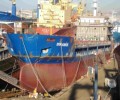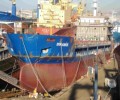

In recent times, the Indian Prime Minister Mr. Narendra Modi unveiled, the scrapping policy of cars and vehicles. The centre for the recycling of cars and vehicles is none other than the place where ships are being recycled: Alang, Bhavnagar.
Early this year during the Union Budget, India has set an ambitious goal of doubling the ship recycling capacity by 2024 with the goal of generating 150000 Jobs and boosting the ship recycling share from 30% to 50%. Thereafter, India enacted the Recycling of Ships Act, 2019 and acceded to the Hong Kong International Convention, which will make around 90 yards at Alang: Hong Kong Convention compliant.
This initiative comes at a time just before cop 26 and the IPCC report as we can collectively understand that recycling is a readily Deployable instrument for any government to battle climate change. While many of us are asking about projects which are robust to the impacts of climate change and disaster, we must realise the projects which may prevent climate change and disaster. Recycling is one such industry. While understanding the economics of recycling projects, I realized that in a growing economy, like India, recycling can play a very important role in a circular economy. Especially when the Indian economy, is being fuelled by internal demands and not based on exports alone. The projects are not exactly recycling but upcycling. We do not recycle; we use the recycled product in its physical form to create something new.
India’s plan suffered a setback when European Commission said that they will no longer be able to include yards in their list of approved yards from non-OECD countries under the strict Basel Ban Amendment. EU Ship Recycling Regulations still remain the top benchmark specific to ship recycling over the Basel Convention and the Hong Kong Convention. The Basel Convention and the technical guidelines remain the standard for hazardous waste and downstream waste management.
To give you a background, the E.U. represents a success story of regional cooperation in the field of environmental protection. The Treaty of Rome, 1957 which established the European Economic Community, had no explicit reference to the environment until 1986, It was the Single European Act (SEA) that formally introduced the environmental policy within the Roman Treaty. Since then, there is no hierarchical distinction between economy and environment. The community environment policy today comprises over 300 legislative acts and regulations. One of them is the EU SRR.
Alang had a few verification visits to the shipyards by the E.U. Commission back last year. However, the Basel Ban Amendment has rendered the EU regulation illegal. During these visits, we have come across several issues that we need to address if we are to achieve the EU SRR (the gold standard). Many of these issues related to, workers’ health, safety, and environmental, are those that can be termed as “fixable”. Then again, some problems seem to be beyond control. Under normal circumstances, we can’t influence the instruments and policies like regulatory bodies, systems, political factors and the subtle-intent.
As part of one such audit, when we sat across to face questions, I understood that there were some very pressing issues that needed to address collectively. There is one crucial aspect of ship recycling that we are missing here, which is the immense socio-economic impact of ship recycling in the region.
We will come back to this.
We must understand that for any environmental policy, the local implementation by regional mechanism is the key to success. A common environmental legislation for all the countries, which are at different levels of development, responsibility for degradation, carrying capacity, and social implications are not exactly an ideal solution here. As a concept sustainability is inbuilt in our culture. Out of the three pillars of sustainability (Social + Economical + Environmental), the social and the economic concerns have been left out of EU SRR. These objectives of sustainable development can be achieved, only if the whole system rather than segregated parts are made policy objects.
Sustainability in ship recycling can only be achieved by a high level of state commitment with an agency preferably Gujarat Maritime Board (GMB) and the State Pollution Control Board under environmental priorities set by the centre/state. It was absolutely of paramount importance that India adopts the Hong Kong Convention and it is just a small step towards sustainability. Further SAARC, which is somewhat equivalent to the European community, constitutes the five south Asian countries that could collectively come up to ratify the convention, which is just a utopian idea.
Coming back to the pressing issues. We have the following significant challenges which are being met by the state (Gujarat Maritime Board)
At first place is the environmental impact, its monitoring, and remediation related to the intertidal zone. As Alang is an open beach, sampling, and testing of a small area less than 100m gives an idea of the entire coast of 10 Km. We know that, before the implementation of any specific regulation related to ship recycling in India, there have been many ships that have been scrapped at Alang in a manner similar to what is being done in most of the non-compliant yards. Where are we headed from here, even if we achieve zero leakages in our 100m intertidal zone? The Gujarat Maritime board taking cognizance of the same initiated environmental monitoring of Alang with Central Salt Research Institute which is an independent institute.
Second, the medical facilities, lack of trained staff and equipment, plague us to the point where we must work collectively beyond our local business priorities and differences. The Gujarat Maritime Board recently allocated funds for the expansion of the existing facilities to include both the Red Cross Hospital and the Alang Multi Speciality Hospital in the vicinity.
Third, our biggest challenge in compliance with EU SRR is downstream waste management. All the regulation has been framed in line with Basel convention, but there is a gap between what is provided for and what finds translation into implementation. The State pollution control board is yet to realize its full potential and certainly requires a renewed focus on implementation issues.
One major ship recycler Mr Rubal Bansal who in recent times recycled the largest container MV Kawasaki and is developing towards EU SRR compliance said: “Alang currently employs about 35000 workers and 200,000 Entrepreneurs directly. Over the years there has been a lot of progress in the way we have recycled ships, contributing to the economy in the form of secondary steel. During the difficult times of the pandemic lockdown, Alang was one of the first industries to restart operations, providing hope in despair. Bansal Shipbreakers have already been awarded a certificate of compliance to HKC by ClassNK and have signed up with Llyod’s Register for issuance of Certificate of Compliance to EU Ship Recycling Regulation”.
COP26 comes at a time when the Hong Kong Convention, the very specific guidelines under the United Nations have not yet come into force but ratified by the Gazette of Indian. Certainly, COP26 is an opportunity for us to push an agreement where the whole world is seen as one big circular economy. The ships may be built in a developed country and may end up being upcycled in a developing country with immense socio-economic benefits. After all, the environmental concerns are global and cannot be dealt with at the local level. Intergovernmental cooperation is the need of the hour.
Source: Arjun Banerjee, Ship Recycling Expert – Environment & Compliance (The above article solely reflects the opinions of the writer and don’t necessarily reflect those of Hellenic Shipping News Worldwide).